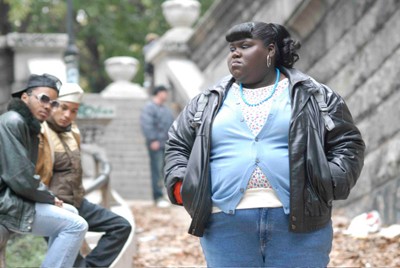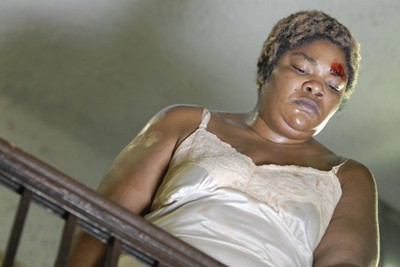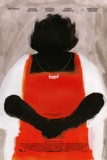| Reviews & Columns |
|
Reviews DVD TV on DVD Blu-ray 4K UHD International DVDs In Theaters Reviews by Studio Video Games Features Collector Series DVDs Easter Egg Database Interviews DVD Talk Radio Feature Articles Columns Anime Talk DVD Savant Horror DVDs The M.O.D. Squad Art House HD Talk Silent DVD
|
DVD Talk Forum |
|
|
| Resources |
|
DVD Price Search Customer Service #'s RCE Info Links |
|
Columns
|
|
|
Precious: Based on the Novel 'Push' by Sapphire

Precious is a sixteen-year-old girl living in Harlem in the late 1980s. She lives with her mother, Mary, who is on welfare and forces her daughter to do the household chores. When her school discovers that Precious is pregnant with her second child, they suggest she'd be better off at an "alternative school" that helps young girls get their GEDs. Precious' first child is called Mongo, short for Mongoloid, and she has Down's syndrome and lives with Precious' grandmother. Mary collects the government stipend for Mongo and for Precious both, thinking it's her due because Precious took her man--even if she doesn't know what the word "stipend" means. Both the first child and the one on the way are the result of Precious being raped by her father, who may be out of the picture but whose gifts keep on giving.
That's a lot of drama for one movie. It's a lot of drama for a couple of movies. Yet, it's the basic plot of Precious, Lee Daniels' coming-of-age picture that is also saddled with the unwieldy subtitle Based on the Novel "Push" by Sapphire. I guess that's what you do when you want people to know that your film is based on a famous book but a bad superhero movie stole your title. Sapphire's novel came out in 1996 and received much praise and not a little consternation and criticism. It was told from the point of view of its main character, the kind of girl the author met when she was teaching literacy courses in New York. The movie's script, adapted by first-time screenwriter Geoffrey Fletcher, tries to stick to that. This is Precious' movie through and through, good and bad.
Claireece "Precious" Jones is played by newcomer Gabourey Sidibe, and much of the considerable praise that has been heaped on this movie is due to her performance. She is utterly convincing as the troubled girl, and she ably portrays the complexity of the character. Precious isn't a one-note construct, a perfect undiscovered genius who has come out of being wronged unscathed. She's angry, sometimes violent, shortsighted, and selfish; she's also sweet, thoughtful, and helpful in her way. When boys disrupt a class she likes, she whacks one of them in the head to make him shut up. She wants to help her teacher, and in her house, that's how you deal with problems. Precious is also a girl who has learned to cope by dissociating into a fantasy world. When the violence is turned against her, she imagines herself with some hot young actor at a movie premiere, where everyone wants her opinion and no one wants to knock her down.
Precious has plenty to escape. Her mother is real piece of work, determined to keep her child dumb and unhappy if it means she has a steady stream of welfare and a permanent servant. Mary is played by comedienne Mo'Nique, transitioning here from her trash-talking stand-up persona into a fierce dramatic performer. Capturing Mary's fury isn't difficult, but finding the pain hidden underneath it is. Like Precious, Mary isn't a simple character, and her behavior is the result of a woman who has no other means of expression. Even her climactic monologue, a heartfelt and emotional piece of work, is confused and troublesome. We are left unsure of what she meant by what she said, but that's because she's not sure either. It's one of the movie's main themes, and the idea that would have spawned the book were Precious real: give people the means to tell their story, and they can confront their problems head on.

Precious is very good when it deals with that stuff. The filmmakers understand the personal emotions that drive their characters, and they bring them to the screen with a gritty documentarian style that lends the drama real credibility. In fact, the further they get away from the more heavy-handed story points, the better Precious is. The interaction of the girls at the special school is just as convincing as anything in last year's The Class and quite a bit funnier.
It's the melodrama that Precious oversells, and some of the clumsy directorial choices weaken the film's overall impact. Employing slow-mo at crucial moments, depicting Precious' glossy fantasies amidst the forced surrealism of her darker memories--these are the clunky tools of an unsure director. Sure, one could argue that Precious has a limited worldview defined mostly by television, and her daydreams would reflect that, but the visuals are cheap and, as a narrative device, the dreams are a bit of a cop-out. (The black-and-white footage with Mo'Nique and Sidibe in an Italian movie makes no sense at all.) It's also indicative of a larger problem in the film. Lee Daniels pushes the melodramatic buttons too hard. When a gentle tap would do, he punches it. Incest. Bam! Neglected children. Bam! HIV. Bam! This stuff is easy for getting a reaction, and Daniels manipulates each new development for all the tears he can jerk out of it. The big love speech they push in the trailers only choked me up because of the potency of the onscreen tears; the showy writing falls flat. The script also loses itself when it's most important. Precious' final transformation happens without us, like someone forgot the scene where the cocoon falls off the butterfly.
At its worst, Precious stinks of a message picture. Unsurprisingly, the movie was produced by Oprah Winfrey and Tyler Perry, neither of whom is known for being subtle with a point. Just look at the division between the two worlds, between where Precious is coming from and where she is going. Her teacher, Blu Rain (Paula Patton), is a lesbian, and the male nurse (Lenny Kravitz) Precious meets at the hospital is two decades ahead of the organic food curve. There's a whole world of diversity waiting to be contrived for you, Precious, don't you see?
Which isn't to say that Precious: Based on the Novel "Push" by Sapphire isn't effective or that it's not worth seeing. Despite those pretty big complaints, the movie is still very good. There is an undeniable humanity in Precious that overcomes its hackneyed flaws, mostly through the sheer will of its actors. As a two-woman show, I could watch Mo'Nique and Gabourey Sidibe throw pots and pans at each other all day. The movie is also more "real" than most rah-rah inner-city teacher dramas, and since it puts the focus on the student and not the professor, likely to be more identifiable and inspiring to teenage girls facing difficult problems. It's just too bad that not all of it was sculpted with the same sensitive hands that pulled those performances together. A little more brains in the script, a little more restraint in the direction, and Precious: Based on the Novel "Push" by Sapphire could have been everything it's been cracked up to be.
Jamie S. Rich is a novelist and comic book writer. He is best known for his collaborations with Joelle Jones, including the hardboiled crime comic book You Have Killed Me, the challenging romance 12 Reasons Why I Love Her, and the 2007 prose novel Have You Seen the Horizon Lately?, for which Jones did the cover. All three were published by Oni Press. His most recent projects include the futuristic romance A Boy and a Girl with Natalie Nourigat; Archer Coe and the Thousand Natural Shocks, a loopy crime tale drawn by Dan Christensen; and the horror miniseries Madame Frankenstein, a collaboration with Megan Levens. Follow Rich's blog at Confessions123.com.
|
| Popular Reviews |
| Sponsored Links |
|
|
| Sponsored Links |
|
|
| Release List | Reviews | Shop | Newsletter | Forum | DVD Giveaways | Blu-Ray | Advertise |
|
Copyright 2024 DVDTalk.com All Rights Reserved. Legal Info, Privacy Policy, Terms of Use,
Manage Preferences,
Your Privacy Choices | |||||||











